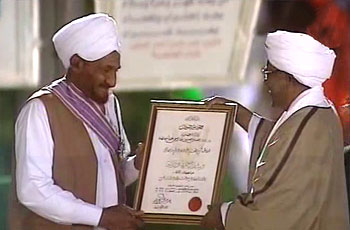Claims Bashir’s presidency is hurting Sudan economically
July 7, 2014 (KHARTOUM) – The head of the opposition National Umma Party (NUP), al-Sadiq al-Mahdi, said that Sudanese President Omer al-Bashir believes that his seat is the only protection against prosecution in the International Criminal Court (ICC).

Furthermore, Sudan will continue to suffer from the impact of US sanctions which al-Mahdi said costs the country $745 million every year.
The former prime minister also noted that Sudan was allocated $350 million under the Cotonou agreement but frozen for the same reason.
“His exit from power makes him vulnerable to arrest and his continuation cripples the country economically,” al-Mahdi said.
The NUP chief emphasised that the issue could be resolved by reaching a compressive political settlement which allows them to appeal to the United Nations Security Council (UNSC) to have the ICC warrant to be deferred.
“But the political movement cannot agree on anything except establishing a new regime but the empowerment people in regime refuse,” he said.
He pointed out that the regime in Sudan is facing deep problems, most notably its neglect of traditional production means after it started relying exclusively since 2000 on oil revenues which without planning for the post-secession phase.
The Sudanese economy has been facing growing woes since the secession of the oil-rich South in mid-2011 and has been seeking external help to shore up its deficits.
Al-Mahdi underscored that the international community is a stakeholder in the Sudanese issue given the dozens of UNSC resolutions adopted under Chapter VII and the deployment of peacekeepers in large parts of the country.
He went on to say that the regime in Sudan is based on the Muslim Brotherhood ideology, but took a pragmatic approach and abandoned much of its slogans to stay in power especially when the 2005 Comprehensive Peace Agreement (CPA) was signed with southern rebels.
Al-Mahdi emphasised that exploitation of “empty” Islamic slogans led to extreme reactions in the right through emergence of fundamentalist groups with al-Qaeda connections. On the other side secular groups emerged to deny the political role of Islam and Africanism to deny Arab identity.
The end result was multiple conflicts that the regime is fighting, he said.
The opposition figure’s strong criticism of the government comes as the national dialogue process launched by Bashir earlier this year appeared to be collapsing.
Despite opposition demands for a postponement to allow dialogue to be fruitful, Bashir announced last week that 2015 elections will proceed as planned next April.
Furthermore, NUP and other opposition parties participating in the dialogue accuse the government of intensifying its crackdown on political and media freedoms.
(ST)
